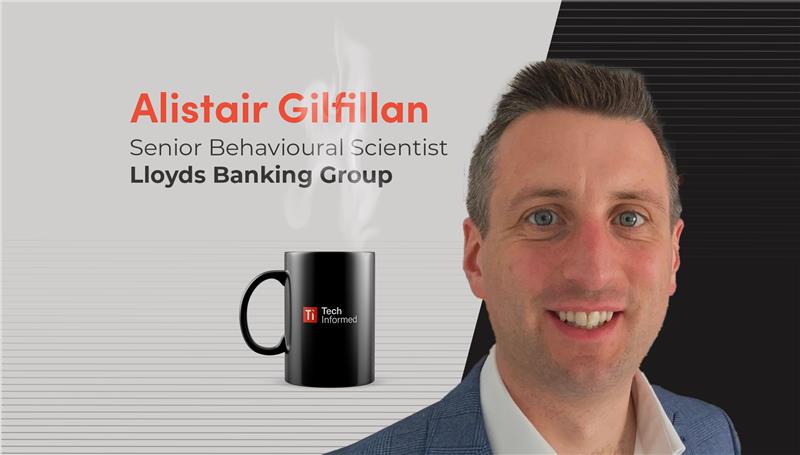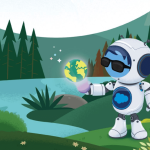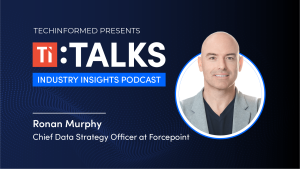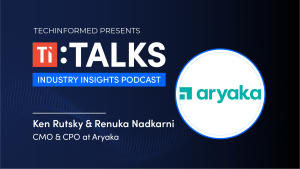

Alistair Gilfillan, senior behavioural scientist, Lloyds Banking Group
Alistair Gilfillan’s career path hasn’t followed the usual banking trajectory. Before joining Lloyds Banking Group as a senior behavioural scientist, he spent years in church-based youth work, had a brief detour into recruitment, and eventually…
Alistair Gilfillan’s career path hasn’t followed the usual banking trajectory. Before joining Lloyds Banking Group as a senior behavioural scientist, he spent years in church-based youth work, had a brief detour into recruitment, and eventually found his way into financial services through a passion for psychology, data, and problem-solving.
That unconventional background has shaped how he approaches innovation at Lloyds, where he blends behavioural science with AI and data-driven experiments to design smarter banking products.
From spearheading initiatives that enhance customer decision-making to leading projects like carbon footprint reporting for SMEs, his work is about making financial systems work better for the people who use them.
It was his first major behavioural science project—a smart savings scheme for lower-income families—that set him on the path to where he is today.
We spoke to Gilfillan about his work, his inspirations, and how technology and psychology can combine to reshape banking
How important are behavioural scientists with the introduction of AI tools?
I think we’re very important in this emerging field, with two main purposes. Firstly, the behavioural science approach of learning through robust experimentation is key: this is an emerging field, and we should base decisions about how we design and use AI applications on behavioural data.
Secondly, we need to learn best practice on how to design good human/AI interactions. Behavioural scientists have lots to offer new primary research into this field.
Can you describe a recent project you worked on and your specific contributions to it?
Our team recently worked on a project delivering carbon reports for small and medium-sized businesses. Many businesses care about sustainability but struggle with where to start. We used transaction data to estimate the carbon footprints of Lloyds Bank clients, removing much of the manual effort typically involved in these calculations.
It was also exciting to see members of our team publish work on the methodology, contributing to the broader knowledge in this space. My role involved coordinating across multiple teams—data engineers, data scientists, visualisation specialists, communications, and business stakeholders—to ensure the project stayed on track and delivered real value to our clients.
Have you conducted any experiments in your role that led to unexpected results?
We run online experiments to see how changes in customer interactions—whether in banking journeys or communications—affect behaviour.
Some behavioural science principles, like the power of social norms, are well-documented and have shown consistent results in our work. However, I’ve been surprised when certain expected effects don’t materialise.
For instance, switching from a “gain” frame (highlighting benefits) to a “loss” frame (emphasising what someone might miss out on) doesn’t always change behaviour as much as research suggests it should. The key takeaway is that context matters and it’s important to formally test and evaluate what you’re doing.
I’m also encouraging our team to predict the outcomes of our experiments, so we can avoid the hindsight bias where we fit a narrative to a result, making it appear obvious after the fact.
How useful are gen AI tools in your day-to-day job?
I find Microsoft’s copilot very useful for meetings: transcribing, summarising and capturing actions very useful, effectively giving anyone secretarial support. I also find it very useful for writing and iterating on code, and the new capabilities within GitHub look promising.
What’s the proudest moment of your career?
Maybe because it involved a free posh dinner that my late Granny could join, but I’d say winning Young Banker of the Year 2018. That award was won based on a proposal for a smart savings scheme that used behavioural science to encourage savings amongst lower-income families, my first application of behavioural science into financial services. The process opened opportunities to transition my career to where I am now.
How do you wind down?
I love playing basketball. It’s something I’ve taken up as an adult, so I’m not very good, but it’s a great workout and immense fun. I set up a social group to play three years ago and we’ve just finished our first season in the local league (we came last – upwards from here!). Other than that, playing board games like Dominion or watching The Traitors.
Do any of your hobbies cross over with your professional life?
I’m fascinated by human behaviour, so all the work we do understanding and influencing behaviour is a big interest. I also learned to code by creating a British Basketball Analysis Twitter page (SLBMaths), which has given me a deeper understanding of data science workflows.
How do you take your coffee?
I’m basically still a child when it comes to drinks, so I don’t like tea or coffee. But I do love an ice-cold diet coke or peach iced tea – caffeine kick and a refreshing taste. Love it.
Need a refill? A coffee with…Brian Polkinghorne, IT manager, Kingsland Drinks









